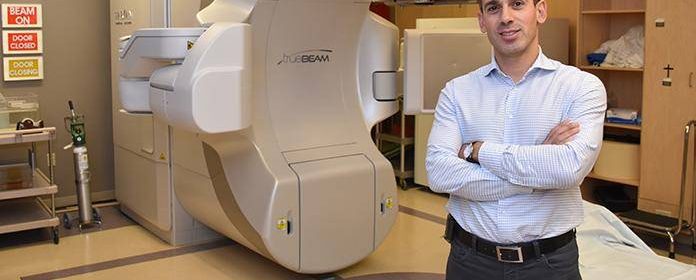Radiation therapy for throat cancer sees better quality of life outcome over robotic surgery, study suggests

A seven-yearlong study by researchers at London’s Lawson Health Research Institute suggests precision radiation therapy results in a better quality of life for patients being treated for oropharyngeal, or throat cancer, compared to transoral robotic surgery (TORS).
The clinical trial, named ORATOR, began in 2012, and was the first in the world to compare the two treatments for the cancer. It involved 68 research participants and six centres across the country, including the London Regional Cancer Program at the London Health Sciences Centre, and was funded by the Canadian Cancer Society.
As part of the study, participants were randomly selected to receive either treatment, Lawson said, adding radiation therapy is often combined with chemotherapy.
The study, the results of which were shared May 31 at the annual meeting of the American Society of Clinical Oncology, found that while survival rates were equal between the two treatments, participants who received radiation experienced better swallowing outcomes.
“A mild decline in swallowing function was observed in 40 per cent of the surgery participants compared to 26 per cent of radiation participants,” read a statement from Lawson. “All participants were able to eat a full diet after treatment but 16 per cent from the surgery group said they needed to specially prepare their food.”
TORS involves the use of a small 3D camera and tiny robotic instruments to remove a patient’s tumours. While early studies suggested it would be better for lowering the risk of developing swallowing issues that are commonly found with radiation treatment, the findings of the ORATOR study challenge that idea, said Lawson associate scientist and LHSC radiation oncologist, Dr. David Palma.
Palma conducted the study alongside Dr. Anthony Nichols, an associate scientist at Lawson and a head and neck cancer surgeon at LHSC — the first centre in the country to offer the TORS procedure.
“Treatments have advanced considerably and are now much more precise, which may be leading to better patient outcomes,” said Palma in a statement. The study also found that those receiving TORS were at more risk of experiencing dangerous bleeding during the surgery procedure, and increased chance of pain and painkiller use one later later.
However, researchers said those who were treated with radiation reported experiencing more short-term constipation, a temporary drop in blood counts, and an increased risk of tinnitus.
A second trial, ORATOR 2, has been launched to further compare the two treatments but using 140 participants.
In a statement, Lawson said rates of the cancer have more than doubled in the last two decades, with a significant uptick in cases caused by human papillomavirus.
Sign up for our Health IQ newsletter
© 2019 Global News, a division of Corus Entertainment Inc.
Source: Read Full Article
